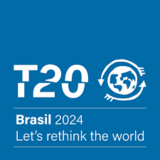External publications

New forms of International partnerships to reduce negative spillover effects in support of global sustainability
Berger, Axel / Grayson Fuller/ Jorge Gómez-Paredes / Sarah Löpelt / Tabea WaltenbergExternal Publications (2024)
T20 Brasil, Task Force 6 (Strengthening Multilateralism and Global Governance), Policy Brief
The G20 is an important international forum to promote the implementation of the 2030 Agenda for Sustainable Development. A major obstacle to sustainable development worldwide that has so far received little attention are negative international spillover effects. These are undesirable external economic, social, environmental, and security effects from a country’s actions which undermine other countries’ efforts to achieve the SDGs. Negative spillovers may reinforce existing international injustices and divergences between countries of different income categories and regions. Assessments show an inverse relationship between domestic SDG progress and the generation of negative spillovers, with high income countries (many G20 countries) having a better performance on the SDGs domestically (higher SDG Index scores), but also more negative impacts abroad (lower International Spillover Index scores). All countries, and especially the G20 given their combined economic weight, must better understand, monitor and manage their spillovers to allow all countries to meet the SDGs. Curbing negative international spillovers requires multilateral solutions, especially across resource-rich and high income consumer countries. Given the global nature of this challenge, the G20 is a suitable forum for discussing solutions. This policy brief brings three recommendations to the G20: 1) Monitor spillover effects, set impact targets, and support statistical capacity; 2) Establish inclusive processes that bring together stakeholders to co-develop multilateral policies and partnerships; 3) Incorporate spillover effects in the G20’s 2030 Agenda Action Plan. The G20’s immediate aim should be to build momentum for a successful Summit of the Future by restoring trust through high-level policy discussions on international spillovers, which have the potential to accelerate the SDG progress. Moreover, the G20 should initiate a structured agenda for upcoming G20 presidencies to tackle spillovers.
Contact
Cornelia Hornschild
Publication Coordinator
E-mail Cornelia.Hornschild@idos-research.de
Phone +49 (0)228 94927-135
Fax +49 (0)228 94927-130
Alexandra Fante
Librarian/ Open Access Coordinator
E-Mail Alexandra.Fante@idos-research.de
Telefon +49 (0)228 94927-321
Fax +49 (0)228 94927-130





![[Translate to English:] Photo: Alexandra Fante, Bibliothekarin/Open Access-Koordinatorin](/fileadmin/_processed_/f/0/csm__c_Deutsches-Institut-fuer-Entwicklungspolitik_Fante_94ce4fa1ba.jpg)